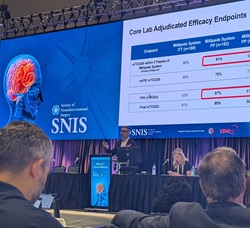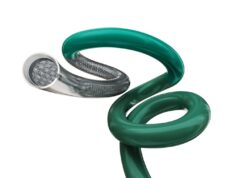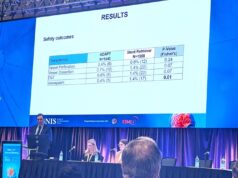
Perfuze has announced the presentation of positive preliminary results from its pivotal MARRS investigational device exemption (IDE) clinical trial at the Society for NeuroInterventional Surgery (SNIS) annual meeting (14–18 July, Nashville, USA).
The trial is evaluating the safety and effectiveness of the Millipede system—which includes Perfuze’s flagship super-bore aspiration catheter, Millipede 88—for revascularisation in acute ischaemic stroke. Conducted across a network of stroke centres in the USA and Europe, the study included patients with occlusions in the internal carotid artery (ICA), M1 or M2 middle cerebral artery (MCA), and basilar and vertebral arteries.
The MARRS trial enrolled 180 evaluable subjects, with direct aspiration being performed using the Millipede 88 in 101 of these patients. The preliminary analysis presented at SNIS 2025 shows a high rate of first-pass effect (FPE), defined as complete or near-complete revascularisation (modified thrombolysis in cerebral infarction [mTICI] 2c) following a single device pass. For patients treated with Millipede 88, an FPE rate of 61% was observed across all target vessels in the per-protocol population, while an FPE rate of 77% was achieved in M1 occlusions specifically.
“The MARRS data are truly exceptional,” commented MARRS study principal investigator Raul Nogueira (University of Pittsburgh School of Medicine, Pittsburgh, USA), who presented these late-breaking results at SNIS 2025. “Achieving 77% FPE for M1 occlusions in a pivotal study is a major advance for stroke care. The ability to reliably achieve rapid, complete reperfusion with a single aspiration pass is exactly what we need to improve efficacy. This technology is a powerful tool that simplifies thrombectomy and delivers outstanding performance.”
Across the 180 patients enrolled, delivery success of the Millipede system was 99% and the median number of passes was one, as stated in a recent press release from Perfuze. Preliminary safety analyses showed a symptomatic intracranial haemorrhage (sICH) rate of 1.7%. Perforation was reported at 0% and the rate of intracranial dissection was 1.1%, indicating a promising safety profile, the release adds.
“The MARRS study represents several years of work by the Perfuze team and our clinical partners,” said Wayne Allen, chief executive officer (CEO) and co-founder of Perfuze. “We designed the Millipede 88 to navigate seamlessly to the clot face, enabling a super-bore catheter that improves the likelihood of achieving FPE. These early data reflect that intent, and we’re encouraged by the physician feedback we’ve received to date.”
The MARRS trial completed enrolment earlier this year, having been executed ahead of schedule—and, with these preliminary data, Perfuze says it is preparing for a US Food and Drug Administration (FDA) submission.
“This is a significant inflection point for the company,” added Perfuze chairperson Hooman Hakami. “Preliminary MARRS results support the Millipede 88 catheter’s safety and effectiveness, and underpin our vision to advance stroke intervention.”









